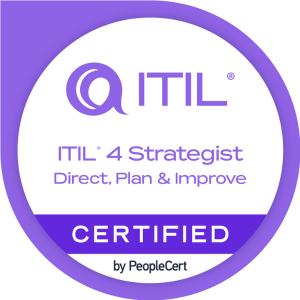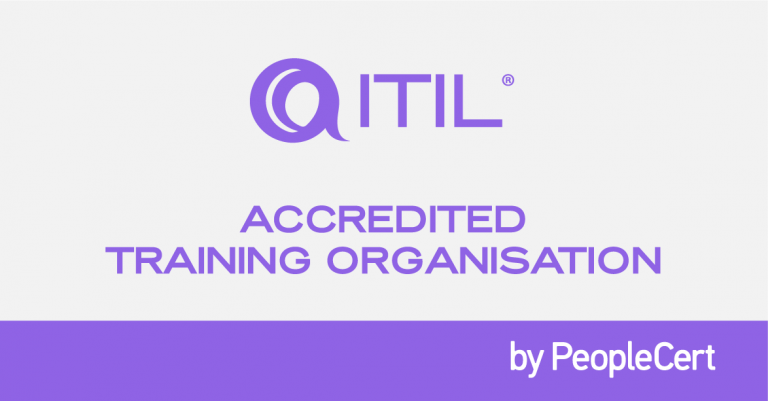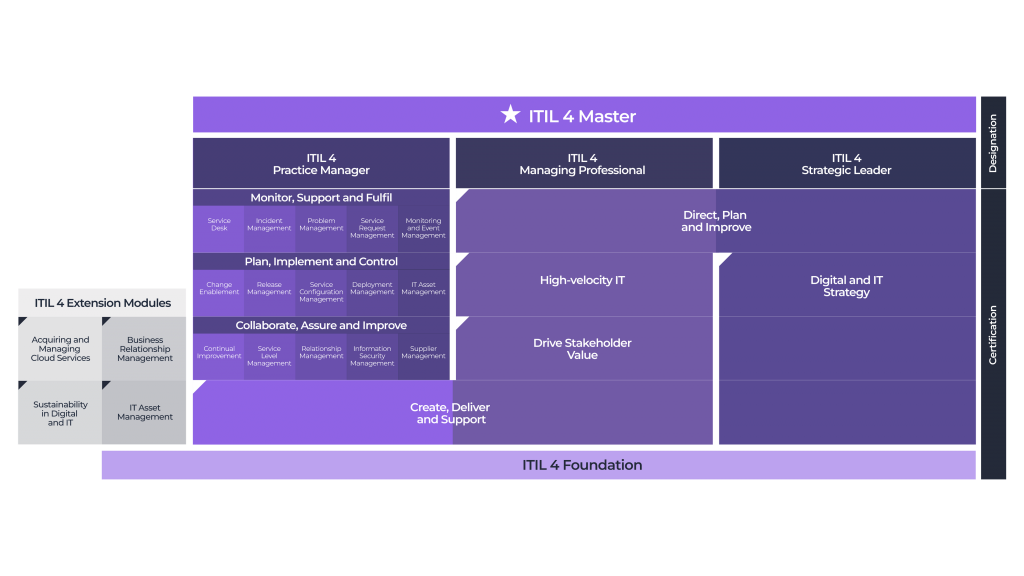ITIL®4 Strategist: Direct Plan and Improve

Align product and service management with modern business requirements
Adopted by many organisations and millions of professionals globally, ITIL will broaden your horizons in the digital world.


Introduction
Course duration: 4 days, 9am – 5pm
This module covers the necessary areas of service management to provide practitioners with the skills necessary to create and sustain a “learning and improving” IT organisation, with a strong and effective strategic direction.
- Key Concepts of Direct, Plan and Improve
- Direction and Planning
- Improvement
- Operating Models
- Methods
- Risks and Scope of Control
- Vision and Mission
- Strategy, Tactics and Operations
- Governance, Compliance and Management
- Policies, Control and Guidelines
- Value, Outcomes, Cost and Risk
- Key Principles and Methods of Directions and Planning
- Cascade Goals and Requirements
- Define effective policies, control and guidelines
- Placing decision making at the correct level
- Role of GRC and integration of principles and methods to the Service Value System
- Role of risk and risk management
- Impact of governance on DPI
- Controls
- Use key principles and methods of continual improvements
- Use the ITIL Continual Improvement model for the service value system
- Identify assessment, objectives, outputs, requirements and criteria
- Selecting an assessment method
- Define and prioritise desired outcomes
- Build and advocate a business case
- Embedding continual improvement at all levels
- Use key principles and methods of communication, organisational change management, methods of measurement and reporting to direct, plan and improve
- Nature, scope and benefits of organisational change management
- Identify and manage different stakeholders
- Effective communication and feedback
- Establish an effective interface across the value chain
- Define metrics and indicators to support objectives
- Understand and know how to direct, plan and improve value streams
-
- Addressing the 4 dimensions of service management
- Applying ITI guiding principles
- Value stream mapping
- Optimising workflow
- Minimising waste
- Ensuring and utilising feedback.
- Difference between practices and value streams
- Understand the key concepts of Direct, Plan and Improve
- Understand the scope, principles and methods of what to be directed and planned
- Understand the role of GRC and how to integrate the principles and methods into the service value system
- Understand and know how to use the key principles and methods of continual improvement, organisational change management, communication, measurement and reporting
- Understand and know how to direct, plan and improve value streams.
- ITSM managers, aspiring managers and practitioners developing their ITSM knowledge based on ITIL4
- ITSM practitioners of all levels involved in shaping direction and strategy or developing a continually improving team
- Individuals who are pursuing the ITIL Managing Professional designation.
EXAMINATION FORMAT
- 40 Multiple Choice Questions
- 1 mark per correct answer
- 28 marks required to pass (out of 40 available) – 70%
- 90 minutes duration
- Closed-book.
PeopleCert’s Continuous Professional Development Programme
All participants with PeopleCert Global Best Practise certification can renew (within 3 years of their original certification dates) and keep your certification current through PeopleCert Continuous Development Programme.

ITIL 4 Master: The Pinnacle of ITIL Achievement
Embark on your ITIL Master Certification journey with Sapience, our expert trainers will guide you through the entire ITIL 4 framework, equipping you with the skills to achieve this prestigious designation. The ITIL 4 Master designation offers a wealth of benefits, including career advancement, proven expertise, differentiation, and leadership recognition. Ready to embark on this rewarding journey? Contact us to learn more about our ITIL 4 Master preparation programmes.
Why Us?
Complimentary refresher
Participants can attend a complimentary refresher if they wish(1-year validity and subject to approval)
Post-training support
Should you have questions after the course, you may contact the trainer for assistance regarding course material
E-learning Portal Access
1 year access to our E-learning portal. Including: - E-books available for download - Official sample exam - Randomised quiz formulated by Sapience Trainers based on past examinations
Trainer profile
Senior Consultant
Sapience Consulting
Principal Consultant
Sapience Consulting
Senior Consultant
Sapience Consulting



